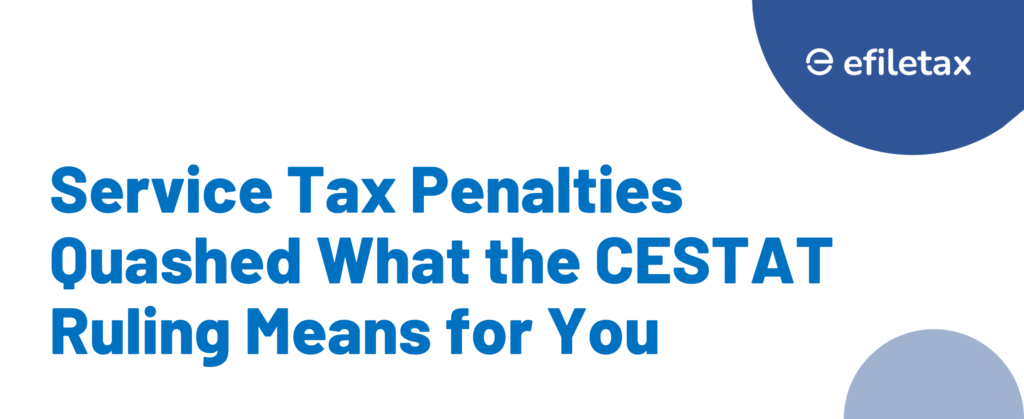
Summary
CESTAT recently ruled that penalties under the pre-GST service tax regime may not apply if tax was voluntarily paid and no intent to evade was proven. However, admitted tax demands remain enforceable.
CESTAT Quashes Service Tax Penalties: What It Means for Taxpayers
In a significant relief to taxpayers, the Customs, Excise and Service Tax Appellate Tribunal (CESTAT) has quashed service tax penalties in multiple cases, while still upholding the admitted tax demands. This ruling is a key development in pre-GST era litigation and can impact thousands of pending service tax cases across India.
Let’s simplify what this ruling means and how it affects your tax position if you’re still facing old service tax demands.
Background: What Triggered These Rulings?
With the advent of GST in July 2017, Service Tax was subsumed under the new regime. However, many cases involving non-payment, short-payment, or late filing of service tax returns remained pending.
In recent CESTAT rulings, the bench observed:
- Taxpayers had already paid admitted tax dues, often before the show cause notice.
- There was no clear evidence of fraud, suppression, or wilful misstatement.
- Hence, invoking Section 78 of the Finance Act, 1994 (which deals with penalty for tax evasion) was unjustified.
Key Takeaways from the CESTAT Decision
| Aspect | CESTAT View |
|---|---|
| Admitted Tax Dues | Must be paid along with applicable interest |
| Penalties under Sec 78 | Can be waived if no intent to evade is proven |
| Voluntary Payment | Favourable consideration if tax is paid before SCN |
| Litigation Impact | Offers relief in ongoing service tax penalty disputes |
Legal Basis: Section 73 vs. Section 78
The tribunal relied on the Finance Act, 1994, especially:
- Section 73(3): If tax is paid before SCN and no fraud is alleged, no penalty should be imposed.
- Section 78: Penalty applies only if suppression, fraud, or wilful misstatement is proven.
🔹 Case Reference:
In [Commissioner of Central Excise v. Ashok Engineering Works], CESTAT ruled that since tax was paid and there was no evidence of evasion, penalty under Section 78 was not sustainable.
Expert View: Don’t Ignore Pre-GST Notices
Tax consultant R. Menon, speaking to Efiletax, warns:
“Many small businesses think GST wiped the slate clean, but pre-GST liabilities are still enforceable. If you’ve received a notice, consult a professional and consider contesting penalties if there’s no fraud involved.”
What Should You Do If You Have a Pending Service Tax Case?
Follow these steps to check if this CESTAT ruling helps you:
- Review the SCN (Show Cause Notice) – Does it mention fraud/suppression?
- Check if tax was already paid before the SCN.
- File reply citing Section 73(3) if no fraud is alleged.
- Seek professional help to present your case before CESTAT or Commissioner Appeals.
Impact on GST Amnesty Scheme and Transition Credit
While this ruling helps with pre-GST penalties, remember:
- It does not impact GST amnesty schemes like Section 128A of CGST Act.
- It also doesn’t affect transition credit disputes under GST.
👉 Read our blog on GST Amnesty Scheme 2025
Useful Links
FAQ – Service Tax Penalties
Q1. Can I ignore old service tax notices under GST?
No. Pre-GST liabilities are still valid and can be recovered with interest.
Q2. Will this CESTAT ruling automatically cancel my penalties?
No. You must contest it based on your facts and cite similar tribunal rulings.
Q3. Can interest be waived if tax is paid voluntarily?
Generally no. Interest under Section 75 is mandatory, but penalty may be waived.
Final Word: Contest Penalties, But Pay Admitted Tax
The CESTAT’s stand is clear – if there’s no fraud, penalties can be set aside. But you must pay what’s due. If you’re confused about your old service tax disputes, let our experts at Efiletax guide you.